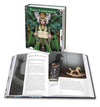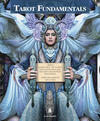Tarot Compendium
Tarot Compendium is the third and final book in an innovative and wonderful series. (The first book in the series is Tarot Fundamentals, and the second volume is Tarot Experience.) This book is 655 large, full-color pages, each one with a creative interior layout. The presentation of the juicy content is beautifully executed due largely to the efforts of Sasha Graham, who took on the Herculean task of synthesizing Lo Scarabeo's years of content into these three complete volumes. She understood the vision of the books to be something "beautiful to look at, a pleasure to peruse, yet full of essential information." Her writing and deft editing ties the material together and does it with style: her writing is often creative and dreamlike but always grounded in tarot).
The content was originally generated for something called Partworks, which is popular in Europe but not in the US. It is a serial/magazine series that comes with an item. For the tarot Partworks, the magazine came with half of a deck (the other half came with the following month's edition). When I've travelled in England, I've purchased knitting Partworks that came with a magazine and yarn and needles for a specific small project. Lo Scarabeo's Partworks content was generated by several authors, including myself and Giordano Berti, Tali Goodwin, Sasha Graham, Marcus Katz, Mark McElroy, and Riccardo Minetti. The work was done as "work for hire," which meant that Lo Scarabeo owned all this material. The material was only ever published in Italian.
Luckily, Lo Scarabeo recognized that the content was too good, so they wisely decided to compile it as beautifully as possible and offer it in English.
Tarot Compendium is focused on the esoteric workings that shape but more importantly power the meanings of the cards. As the introduction says, comparing exploring tarot to exploring a foreign city, "Esoteric information is like miles of electrical lines concealed under pavement. It is the water gushing through the buried pipes so large you walk through them with an elephant. It is the hidden network of tunnels speeding thousands of commuters over tracks to their station stops.
While modern tarot approaches focus on the psychological, often at the expense of the esoteric, we should remember that "the evolution of esoteric Tarot and modern psychology both examine the same thing. They seek to examine and expand the inner life of the individual. Both practices dive into the deep space of the psyche, the places where personalities are formed, where behavior is created, where dreams are born—the palace from which an individual's experience springs. Each modality reaches into darkness and obscurity to seek light and illumination. It is no coincidence that each unfolded next to the other. And it is no coincidence that many therapists, counselors, and psychologists find Tarot a useful tool for their personal and/or professional practice."
This volume covers four esoteric disciplines: Kabbalah, Alchemy, Astrology, and Numerology. Each discipline is introduced and then the connections and application to tarot is provided. The text is, of course, thorough and clearly expressed, but it is, as usual with these volumes, the visual presentation of the information that sets these books apart from others. As you can see from some of the sample pages included, the information is quickly accessible at a glance, making this a useful reference book as well as informative textbook. In addition to reference and information, Tarot Compendium also provides practical techniques associated with each of these disciplines, so any reader will find activities they can use to add depth to their readings.
The section on the structure of the deck may, at first, seem like a repetition of foundational material, but it is not. This exploration of structure is very unique and rarely taught these days. You will learn about Wirth's dry/Doric and humid/Ionic paths and the four paths he associates with those paths. Then we study the relationships formed by arranging the cards in these paths and branches, revealing even deeper understandings of the cards, something for which most readers long.
A juicy section on the Myers-Briggs approach to personality gives us an opportunity to get to know the court cards even better. Shadow work, dignities, color symbolism, and spellwork provide even more avenues of understanding and using the cards. For those interested in reading professionally (a natural development as one studies the cards), there is a helpful chapter on developing and running a tarot business. Over a dozen spreads, some with examples, provide even more tools to add to your spread and technique collection. And we cannot forget the card-by-card advanced meanings and associations section that weaves together all the esoteric disciplines, as well as things like musical pitch, magical uses, herbal attributions, and light/shadow meanings.
This volume will give any reader enough techniques and information to keep them busy with diving deeper into the cards and learning about themselves for years. As Sasha says, "Tarot is truly a reflection of the universe. So when you gaze at the night sky or at an illustration of the Tree of Life or you find yourself counting up numbers and suits, what you are really doing is finding you. As always, we look closely at Tarot only to find ourselves reflected back."

About Barbara Moore
Related Products



is subject to certain Terms and Conditions


